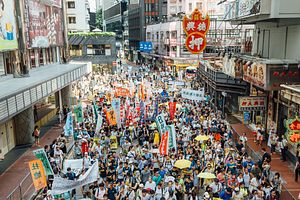The United Kingdom has issued its latest biannual report on Hong Kong. While the report found that the “one country, two systems” arrangement “has, in very many areas, continued to function well,” it also noted “grounds for concern” when it comes to the protection of certain rights and freedoms in the Special Administrative Region.
The reports on Hong Kong, provided to Parliament by the foreign secretary, originated out of a desire to hold Beijing accountable for its promises – both to the U.K. and to Hong Kong – prior to the Chinese government regaining control over Hong Kong in 1997. That included a promise that Hong Kong could keep its unique economic and political systems for the next 50 years. The “one country, two systems” formula, as Foreign Secretary Philip Hammond noted in the forward to the report, “stipulates that Hong Kong enjoys a high degree of autonomy, an independent judiciary, and freedoms including of the press, of academia and of expression.”
However, there has been increasing concern over the past few years that Beijing is unduly encroaching on Hong Kong’s freedoms. The Occupy Central protests of fall 2014 grew out of this fear; Hongkongers who joined the protest rejected the central government’s blueprint for democratic elections of Hong Kong’s chief executive, on the grounds that Beijing would effectively be able to handpick which candidates would stand for election.
More recently, the disappearance of a number of Hong Kong residents – all of whom were connected to a publishing company specializing in sensationalized accounts of Chinese leaders – has sparked fears of extra-judicial extraditions from Hong Kong to China, and an erosion of the freedom of speech. Though several of the missing have since sent messages saying they went to China of their own accord, many observers believe those reassurances were coerced.
Hammond seems to agree with that camp. In his foreword, Hammond says that “our current information indicates that Mr Lee [Lee Po, a British citizen and Hong Kong publisher] was involuntarily removed to the mainland without any due process under Hong Kong SAR law.”
“This constitutes a serious breach of the Sino-British Joint Declaration on Hong Kong and undermines the principle of ‘One Country, Two Systems’ which assures Hong Kong residents of the protection of the Hong Kong legal system,” Hammond noted. He called for Lee’s “immediate return to Hong Kong” and urged the Chinese government “to reassure the people of Hong Kong that … the fundamental rights and freedoms of Hong Kong residents will continue to be fully protected, and respected by all, in accordance with the Joint Declaration and Basic Law.”
The report also noted concerns from the Hong Kong Journalists Association that press freedoms were eroding. The HKJA pointed to injuries to journalists during protests (at the hands of both police and protesters) as well as “escalating self-censorship” among journalists. In the same vein, the report noted concerns over the independence of Hong Kong media outlets, a worry amplified by the purchase of South China Morning Post by Alibaba Group, one of mainland China’s most prominent companies. “A number of analysts raised concerns over the effect on media plurality, with many of Hong Kong’s papers and magazines now owned by mainland-based companies,” the report said.
In the foreword, Hammond reiterated the United Kingdom’s support for universal suffrage in Hong Kong, and called for a return to dialogue over possible constitutional reform in Hong Kong, which would provide a blueprint for direct elections of the chief executive. “A more democratic and accountable system of government would help strengthen those rights and freedoms which have come under increasing pressure over the past two years,” he wrote.
In June 2015, the Legislative Council officially rejected the Beijing-backed constitutional reform plan; pan-democrats were able to block the plan from receiving the two-thirds majority necessary for passage.
The report concluded that “‘One Country, Two Systems’ has in the vast majority of areas continued to function well.” However, it also warned that certain “rights and freedoms have come under unprecedented pressure during the reporting period.”
“We urge the authorities in Hong Kong and Beijing to take the necessary steps to maintain confidence in the system and the sanctity of the rights, freedoms and values it upholds,” the report said.
Beijing, however, doesn’t seem interested in taking up London’s advice. In a statement, Foreign Ministry spokesperson Hong Lei effectively told the U.K. to mind its own business: “The so-called ‘responsibility’ that the British side claimed to have over Hong Kong does not exist. We ask the British side to mind its words and actions and stop interfering in Hong Kong affairs.”
As for the merits of the report itself, Hong called it “groundless accusations against China” and said Beijing was “strongly dissatisfied with and firmly opposed to” the “interference” of the report.
Hong also defended the implementation of “one country, two systems,” saying that it “has been proved to be a great success, and is recognized by the world.”
“The Chinese government is resolute in carrying forward ‘one country, two systems’ and this resolve is subject to no change,” Hong said.

































